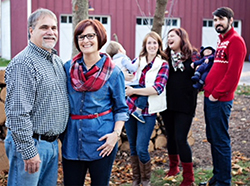Multiple Myeloma Survivor
Blue Skies & Green Leaves
 Kathy Velasco Pedersen’s doctor doubted she had multiple myeloma because she was only 39. The surprise diagnosis not only brought with it complicated treatments, it came with a flood of emotions. She credits an amazing support system with helping her manage her disease.
Kathy Velasco Pedersen’s doctor doubted she had multiple myeloma because she was only 39. The surprise diagnosis not only brought with it complicated treatments, it came with a flood of emotions. She credits an amazing support system with helping her manage her disease.
I saw a rheumatologist in October 1998, hoping to find the source of my chronic pain. The doctor thought it might be fibromyalgia but ran additional labs to rule out more serious conditions. When my results came back with an elevated protein indicative of multiple myeloma (MM), she referred me to a hematologist.
Bone marrow biopsy and 24-hour urine collection results confirmed my diagnosis. I was referred to an MM specialist and was told I should do everything he suggested or I’d be dead in five years. (My doctor did not have the best bedside manner.)
The day I was diagnosed will always be frozen in time. My first reaction was guilt. Between tears, I turned to my husband and said, “I’m so sorry!” I have a very close, very large family, and thinking how this would affect them was almost more than I could bear.
Treatment would be chemotherapy followed by stem cell transplantation. At the time, the prognosis for MM was not good, so my family tried to keep me off the Internet. I got so much positive energy, but, then I’d read the statistics online and think I was kidding myself that I could beat this beast. It was an emotional rollercoaster … lots of tears, lots of prayers and lots of questions.
A month after diagnosis, I began chemo. I received four treatments, once a month, with excellent tumor reduction. Each month got harder. After the third treatment, I begged to postpone the fourth. My medical team assured me I could do it, and we proceeded. After it was over, I felt so weak that my transplant doctor agreed to let me wait a few months to have the transplant. My chemo ended in February 1999, and I entered the hospital for my transplant in late May.
Originally, the doctor recommended an autologous transplant followed by an allogeneic one. I wasn’t confident I could survive both so I agreed to the allogeneic only. My 32-year-old sister, Tracey, was chosen as my donor. I received a “mini transplant.” It was “mini” because I had lymphatic radiation only instead of full body radiation, and my chemo was a bit less potent.
My transplant wasn’t easy. An E. coli infection, leading to sepsis, nearly took my life, but I received exceptional care and compassion from my transplant team.
My transplant engraftment didn’t take place at the expected time, and I was told my transplant had failed. Miraculously, about a week later, my labs indicated engraftment was happening. That was one of the happiest days of my life! My sister donated a second batch of stem cells, and I received a “booster” transplant from her.
My recovery was thwarted by a nasty bout of graft-versus-host disease (GvHD). Thankfully, it attacked my skin and not my vital organs, but it was very aggressive. I received steroid and pain injections directly into my mouth to treat the many mouth lesions. Because the GvHD took two years to burn out, I was on high doses of steroids for much longer than is ideal, which led to some serious side effects then and years later.
I tried to keep my kids’ lives as “normal” as possible, but the trauma that comes from having a sick parent is unavoidable. My kids came out stronger on the other side, with more compassion for others going through similar difficulties.
My family gave me an amazing amount of physical and emotional support. My husband talked me off many a ledge. He always told me I’d be OK. Most days, I believed him.
During my transplant, my family rented a house close to the hospital. Friends and family took turns staying overnight with me in my hospital room. My dad learned how to flush my port, and my sisters and friends took our kids for many sleepovers. My church family also provided support. A cancer patient really does need a village, and I was blessed to have one.
I volunteer with LLS First Connections Program, speaking to newly diagnosed MM patients. My advice is to take one day at a time and try to control your negative thoughts. They will never help you. I focused on scripture, calming music and worship to keep my mind focused on the positive.
Listen to your body. Err on the side of safety. Run, don’t walk, to your doctor or ER if you feel off. Give yourself permission to do nothing. This is temporary, so don’t get hung up on being “unproductive.” I think resting enabled my body to heal. Ask about the impact treatments may have in the short and long term. I still deal with many side effects.
Despite these physical challenges, I live a full life. I have an online vintage decor business. Since my transplant, I have traveled, seen both of our children graduate from college and attended our son’s wedding. I dote on our three perfect grandsons regularly. Survivorship is all about finding your new normal, and my new normal is pretty darn good.


